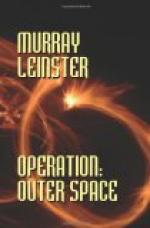Merely arriving at the moon did not seem an especially useful achievement, either to Cochrane or to humanity at large.
Things looked bad.
CHAPTER TWO
Cochrane stood when the stewardess’ voice authorized the action. With sardonic docility he unfastened his safety-belt and stepped out into the spiral, descending aisle. It seemed strange to have weight again, even as little as this. Cochrane weighed, on the moon, just one-sixth of what he would weigh on Earth. Here he would tip a spring-scale at just about twenty-seven pounds. By flexing his toes, he could jump. Absurdly, he did. And he rose very slowly, and hovered—feeling singularly foolish—and descended with a vast deliberation. He landed on the ramp again feeling absurd indeed. He saw Babs grinning at him.
“I think,” said Cochrane, “I’ll have to take up toe-dancing.”
She laughed. Then there were clankings, and something fastened itself outside, and after a moment the entrance-door of the moonship opened.
They went down the ramp to board the moon-jeep, holding onto the hand-rail and helping each other. The tourist giggled foolishly. They went out the thick doorway and found themselves in an enclosure very much like the interior of a rather small submarine. But it did have shielded windows—ports—and Babs instantly pulled herself into a seat beside one and feasted her eyes. She saw the jagged peaks nearby and the crenelated ring-mountain wall, miles off to one side, and the smooth frozen lava of the “sea.” Across that dusty surface the horizon was remarkably near, and Cochrane remembered vaguely that the moon was only one-fourth the size of Earth, so its horizon would naturally be nearer. He glanced at the stars that shone even through the glass that denatured the sunshine. And then he looked for Holden.
The psychiatrist looked puffy and sleepy and haggard and disheveled. When a person does have space-sickness, even a little weight relieves the symptoms, but the consequences last for days.
“Don’t worry!” he said sourly when he saw Cochrane’s eyes upon him. “I won’t waste any time! I’ll find my man and get to work at once. Just let me get back to Earth....”
There were more clankings—the jeep-bus sealing off from the rocket. Then the vehicle stirred. The landscape outside began to move.
They saw Lunar City as they approached it. It was five giant dust-heaps, from five hundred-odd feet in height down to three. There were airlocks at their bases and dust-covered tunnels connecting them, and radar-bowls about their sides. But they were dust-heaps. Which was completely reasonable. There is no air on the moon. By day the sun shines down with absolute ferocity. It heats everything as with a furnace-flame. At night all heat radiates away to empty space, and the ground-temperature drops well below that of liquid air. So Lunar City was




